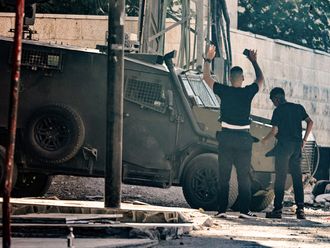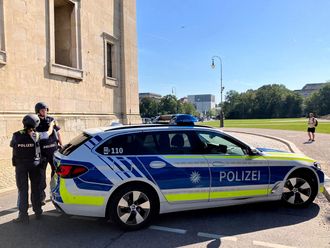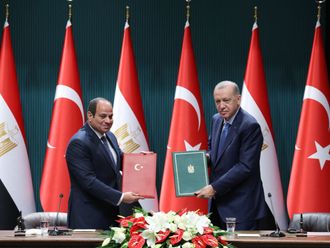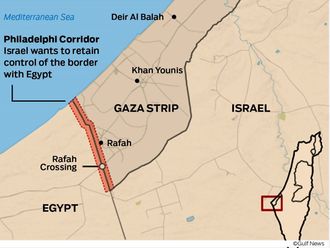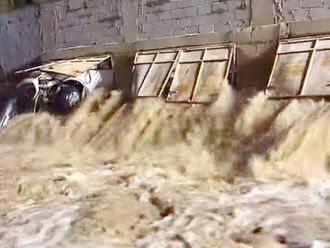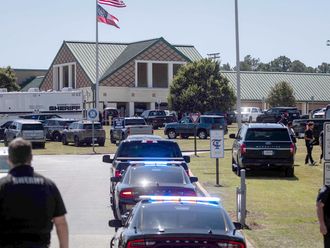Cairo: Egypt’s military-backed government this week ordered freezing the assets of more than 1,000 Islamist charity groups as part of a draconian crackdown on the one-time governing Muslim Brotherhood.
Government officials said the move was in compliance with a September court ruling outlawing the Brotherhood and freezing assets of its subsidiaries.
Most such charities have denied links to the Brotherhood, warning that the asset freeze will hit thousands of poor people in Egypt hard where around 40 per cent of the 85 million population are believed to live below the poverty line.
“We are a religious and social society, which has nothing to do with politics or the Brotherhood,” said Abul Atta Abdul Qader, a board member of Ansar Al Sunna, one of around 1,055 charity organisations covered by the controversial ban.
“Our activities depend on donations and we do not receive any money from abroad or the Brotherhood,” he told Gulf News.
Abdul Qader’s organisation has 260 chapters, which he said offers monthly financial support for the needy and help cover the marriage costs of the poor girls.
“The freeze decision will harm thousands of families. It is unfair to hamper the charitable works done by more than 1,000 societies on mere suspicions.”
Abdul Qader added that his organisation has not been officially notified of the freeze, but some affiliated offices have suspended their services.
Egyptian authorities have pursued a massive-scale clampdown on the Brotherhood since July when the military deposed Islamist president Mohammad Mursi following enormous street protests against his one-year-old rule.
Hundreds of senior officials and followers of the Brotherhood, to which Mursi belongs, have been rounded up on charges of inciting violence. The military-installed government Wednesday declared the Brotherhood a terrorist group, a charge that carries the death penalty.
The Salafist Al Nour Party, an ally of the government, has criticised the crackdown on Islamist charity groups.
“This decision will harm large numbers of the poor and patients, especially in view of the deteriorating economic situation in the country,” said the party’s chief Younis Makhyoun.
“I don’t know the aim of the government at this bad time. Does fighting terrorism mean halting all charity works without thorough examination?” he added in a statement.
Charitable hospitals have started discharging premature babies from their incubators, after their operators were denied access to their bank assets, reported local media.
“The hospital, where my baby used to receive free medical treatment, handed him over to me, saying they can no longer spend on his treatment,” said Shawki Al Sayyed, a Cairo father. “I’ll take him to a government-run hospital. If they refused to admit the baby, I would take him to the office of [Prime Minister Hazeem] Al Beblawi and demand him to provide us with free medical treatment,” he told the independent newspaper Al Masry Al Youm.
The Brotherhood called the crackdown on charity groups a “war against Islam”.
“They [state authorities] are acting like this because they hate the Brotherhood. For this, they fight Islam, which calls for good deeds and care for the poor,” it said in a statement.
“This fierce campaign on Islamic charity societies opens the door wide for proselytising organisations to convert the poor Muslims.”
The 85-year-old Brotherhood has long built its popularity in Egypt on a massive network of social services and economic assistance to the poor.
The government has said its decision to freeze charity organisations’ assets is aimed at stopping the Brotherhood’s alleged control on them.
“The decision does not aim to stop the services offered by these societies to citizens,” said Ezzat Khamis, the head of a governmental committee in charge of managing Brotherhood’s property and assets.
“The aim is to stop the Brotherhood from dominating these societies and exploiting them in activities against the state,” he told a press conference Thursday.
“The societies whose assets have been frozen will resume their activities because we believe they play an important role in serving citizens.”
The Ministry of Social Solidarity has said sub-committees will examine the financial and legal status of the groups and manage those with proven links to the Brotherhood.


